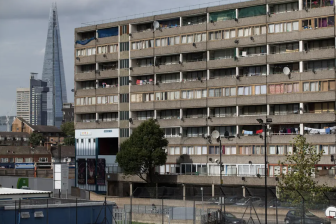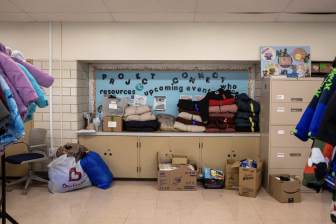
Young homeless people say they are ‘dismissed and ignored’ when they ask the authorities for help
‘Dismissed and ignored’ – those are the feelings of young homeless people in the UK feel when they ask the authorities for help.
That’s the conclusion of a new report carried out for a London-based youth homelessness charity, which highlights the challenges faced by young vulnerable people as they move into adulthood.
The study, carried out by the London School of Economics (LSE) on behalf of the New Horizon Youth Centre, saw 15 young people interviewed in detail about their experiences, while representatives from four London councils, central government and the voluntary sector were also spoken to.
New Horizon says that over the summer & autumn period last year, it saw a 65 per cent increase in demand for its services, with an average of nearly 50 people, many of them young, coming through its doors every day. An estimated 135,800 young people aged 16-24 presented to councils as homeless, or at risk of homelessness in 2022/23, with over 20,000 of those young people presenting to councils for support in London alone.
‘Having a charity advocate on their behalf was crucial’
New Horizon says this represents a rise of fiver per cent nationally since 2021/22, and a 10 per cent increase in London. The numbers of young people contacting their local authority when they are homeless or at risk of homelessness is only a fraction of the overall numbers, with estimates suggesting that 48 per cent of all young people experiencing homelessness do not contact their local authority at all, or when they do face ‘significant’ barriers.
The report found there were several barriers experienced by young people when approaching a local authority for support and that having a charity advocate on their behalf was often crucial.
Barriers included a lack of clarity and communication from the local authority in what they could offer, and what young people were entitled to; not knowing where to go or how to access support; feeling dismissed by staff; being passed from person to person without receiving any support; having to repeat their story multiple times; and unrealistic evidence requirements.
These barriers led to young people feeling disillusioned with services, not getting the support they deserve and need, and seeking informal solutions to their homelessness.
Phil Kerry, CEO of New Horizon Youth Centre, said: “We had our busiest ever day in January 2024 and the worrying spike in youth homelessness that we’ve seen across the UK shows no sign of stopping this year. It is vital that the support offered by local authorities to young people experiencing homelessness is suitable, effective, and timely in ending their homelessness. However, many young people tell us this is not their experience.
“We recognise the extreme pressures that all council authorities are under at the moment, especially in London and this makes it even more important that they work together alongside charities and the Government to implement the recommendations in this report, ensuring that young people affected by homelessness are not left behind.”
The report also highlights the challenges facing young people as they turn 18 and they must learn to navigate adult services. This was described as a significant challenge for young people, who felt they still needed support tailored to their age.
Housing leads at local councils say they are providing support in a ‘hugely challenging environment’, including increasingly stretched budgets and lack of availability of suitable housing. The report recommends they must work with each other, and collaborate with the voluntary sector, to ensure resources are used most effectively.
‘Hugely challenging environment’
The report highlights some best practice examples of where this is happening successfully and emphasised the importance of sharing these. These include a London-wide centralised website for young people setting out rights and options available to them which would identify help available within each borough alongside voluntary support services.
Other recommendations emphasise that the government should also commit to a national strategy to end youth homelessness with a focus on specific allocations for new housing that meets the needs of young people.
Laura Lane, Policy Officer at LSE Housing and Communities at the Centre for Analysis of Social Exclusion, said: “This report is timely and shows the value to young homeless people of receiving appropriate support and feeling that people are ‘on their side’. We hope that it supports increased engagement and collaboration between local authorities and charities in order to tackle the increasing challenges of youth homelessness.”
Click here to access the report.




